- Home
- Georgette Heyer
Behold, Here's Poison Page 2
Behold, Here's Poison Read online
Page 2
‘I can’t see that it matters in the least,’ said Guy. He grasped the rail at the foot of his mother’s bed, and stood looking down at her with bright, uncomprehending eyes. ‘I can’t grasp it!’ he announced. ‘I mean, uncle’s dying like that. Of course, everybody expected it in a way, I suppose. I mean, his blood-pressure. What do you think he died of ? Do you suppose it was apoplexy? I always thought he’d have apoplexy sooner or later, didn’t you, Stella? Will there have to be an inquest? I don’t see why there should be, do you? I mean, everyone knows he had a weak heart. It’s obvious he died of it.’
‘Yes, dear, but we won’t talk of it now,’ Mrs Matthews said repressively. ‘You are upset, and you let your tongue run away with you. You must try and realise what it all means to me. I sometimes think poor Gregory was fonder of me than of his own sisters. I do try always to see only the good in everybody, and Gregory responded to me in a way that makes me very happy to look back upon.’
‘Oh Gawd!’ said Guy rudely.
Mrs Matthews compressed her lips for a moment, but replied almost at once in an extremely gentle voice: ‘Go and dress, Guy dear. A dark suit, of course, and not that orange pull-over. You too, Stella.’
‘Actually, I hadn’t thought of the orange pull-over,’ said Guy loftily. ‘But I utterly agree with Nigel about mourning. It’s a survival of barbarism, and, as he says –’
‘Darling, I know you don’t mean to hurt me,’ said Mrs Matthews sadly, ‘but when you treat sacred things in that spirit of –’
‘You’ve simply got to realise that I’m a Pure Agnostic,’ replied Guy. ‘When you talk about things like death being sacred it means absolutely nothing to me.’
‘Oh, shut up!’ interrupted Stella, giving him a push towards the door. ‘Nobody wants to listen to your views on religion.’
‘They’re not particularly my views,’ said Guy, ‘but the views of practically all thinking people today.’
‘Oh yeah?’ said Stella inelegantly, and walked off to her own room.
Mary’s surmise that Dr Fielding had been called out before breakfast was proved to be correct. He had not returned to his house when Beecher rang up, and it was not until both Stella and Guy had bathed and dressed that he arrived at the Poplars. By that time Miss Matthews, recovering from her fit of crying, had also dressed, and had not only telephoned to her elder sister, Gertrude Lupton, but had found time to give a great many orders to Mrs Beecher for the subsequent using-up of the fish and the eggs already cooked for a breakfast she felt sure no one could think of eating. These orders were immediately cancelled by Stella and Guy, who were feeling hungry, and an altercation was in full force when Dr Fielding walked into the house.
He was a tall man in the middle-thirties, with very wide-set grey eyes, and a humorous mouth. As he stepped into the hall he exchanged a glance with Stella, who at once went forward to greet him. ‘Oh Deryk, thank God you’ve come!’ she said, taking his hand.
‘Stella, not with your uncle lying dead upstairs!’ begged Miss Matthews distractedly. ‘Not that I disapprove, because I’m sure dear Dr Fielding – But after all Gregory said – though I daresay he feels quite differently now that he’s passed on: I believe they do, though I’ve never been able to understand why. Oh dear, how very confusing it all is! If I’d ever dreamed it would all be so difficult and unpleasant I should have been the last person in the world to have wanted Gregory to die. It was the duck, doctor. I implored him not to eat it, but he would go his own way, and now he’s dead, and there are two beautiful lamb cutlets gone to waste. Eaten in the kitchen! English lamb!’
Dr Fielding, returning the pressure of Stella’s fingers, broke in on this monologue to request that he might be taken at once to Gregory Matthews’ room.
‘Oh yes!’ said Miss Matthews, looking round in a flustered way. ‘Of course! I should take you up myself, only that I feel I never want to enter the room again. Guy, you are the man of the house now!’
‘No one need take me up,’ replied Dr Fielding. ‘I know my way.’
Beecher coughed, and stepped forward to the foot of the stairs. ‘If you please, sir, I will escort you to the Master’s room.’
The doctor looked at him. ‘You were the one who found Mr Matthews, I think? By all means come up.’
At the head of the stairs he was met by Mrs Matthews. She was dressed in a becoming black frock, and greeted him in a voice rather more fading than usual. She was not a patient of his, because she mistrusted all General Practitioners, but as a man (as she frequently observed) she liked him very well. Now that Gregory Matthews’ opposition had been cut short in this summary fashion she was even prepared to accept the doctor as a son-in-law. So there was just a suggestion of sympathetic understanding in the smile she bestowed on him, and she said: ‘I expect Stella has told you. We can’t realise it yet – perhaps mercifully. And yet, when I woke this morning, I had a sort of presentiment. I can hardly describe it, but I think that people who are rather highly-strung, which I’m afraid I am, are more sensitive than others to – what shall I call it? – atmosphere.’
‘Undoubtedly,’ replied the doctor, who knew her of old.
‘It was of course a heart-attack, following on acute indigestion,’ stated Mrs Matthews. ‘My poor brother-in-law was sometimes very headstrong, as I expect you know.’
‘Yes,’ agreed the doctor, edging his way past her. ‘Very headstrong, I’m afraid.’
She let him go, and proceeded on her way downstairs while Beecher unlocked the door of Gregory Matthews’ room, and ushered the doctor in.
He did not say anything when he saw the body lying on the bed, but bent over it with his brows drawn close. Beecher stood watching him while he made his examination, and presently said: ‘I suppose it was a natural death, sir?’
Dr Fielding looked up quickly. ‘Have you any reason to think that it was not?’
‘Oh no, sir, only that he does look awful, and his eyes being open like that don’t look right, somehow.’
‘Is that all! If you take my advice you won’t spread that kind of rumour about. It might get you into trouble.’ Dr Fielding transferred his attention to the bed again, finished his examination, and straightened himself.
Beecher, opening the door for him, volunteered the information, in a rather offended tone, that the body had been cold when he had found it at eight o’clock. The doctor nodded, and passed out of the room to the head of the stairs.
Below, in the hall, the party had been augmented by the arrival of Mrs Lupton and her husband, who had motored over from their house on the other side of the Heath. The presence of Henry Lupton, a little, sandy-moustached man with weak, worried blue eyes, was generally felt to be insignificant, but Gertrude Lupton’s personality made her a formidable and unwelcome visitor. She was a massively built woman of about fifty-five, extremely upright, and reinforced wherever possible with whalebone. She even wore it inserted into the net fronts which invariably encased her throat. Her hats always had wide brims and very high crowns, and her face-powder was faintly tinted with mauve. She had been the nearest to Gregory Matthews in age of all his family, and the most like him in temperament. Both resembled nothing so much as steam-rollers in their dealings with their fellow creatures, but the difference between them had lain in the fact that whereas Gregory Matthews had been subject to awe-inspiring rages no one had ever seen Gertrude lose one jot of her implacable calm.
She was perfectly calm now, though evidently in the grip of some powerful emotion. She stood resting one hand on the gateleg table in the middle of the hall while she delivered herself of various forceful statements. Dr Fielding, pausing on the top stair, heard her quell Harriet’s volubility with a stern admonition to the unfortunate lady to control herself; and annihilate Mrs Matthews, who had unwisely repeated the history of her premonition, by saying: ‘I have the greatest dislike for that kind of foolish talk, and I must say that I consider it quite uncalled-for in one who was no relation of my poor brother whatsoever. I sincerel
y trust, Zoë, that you will abandon any attempt to make yourself the central figure in this appalling affair, though I am bound to confess from my knowledge of you that it would be extremely like you to try to focus the limelight on yourself.’
The candour (and indeed the blunt truth) of this speech came as near to confounding Mrs Matthews as anything could. The doctor, descending the stairs, thought that it said much for her control that she was able to reply, with unimpaired charity: ‘Ah, my dear Gertrude, I’m afraid that you strong-minded women don’t always understand us highly-strung creatures.’
‘I understand you perfectly, and I may say that I always have,’ replied Mrs Lupton crushingly. She became aware of the doctor’s approach, and wheeled round to confront him. ‘Dr Fielding, I believe. I have heard of you from my brother.’
Her tone implied that she had heard no good of him. He answered somewhat stiffly: ‘I have been attending Mr Matthews for some time, so I imagine you might.’
She looked him over. ‘And what,’ she demanded, ‘was, in your opinion, the cause of my unfortunate brother’s death?’
‘In my opinion,’ replied Fielding with a touch of sarcasm, ‘your brother died from syncope.’
‘What on earth’s that?’ inquired Stella, who had come out of the dining-room as soon as she had heard his voice.
‘You will oblige me,’ said Mrs Lupton, ignoring her niece, ‘by being more precise.’
‘Certainly,’ said Fielding. ‘Your brother, as no doubt you know, suffered from a high blood-pressure, coupled with a slight valvula affection of the –’
‘I am quite aware of the fact that you have been treating my brother for heart-trouble,’ interrupted Mrs Lupton, ‘but I can only say that if he had a weak heart he was the only one of our family thus afflicted. I never believed in it. We come of extremely healthy stock. I am sure that such a thing as a weak heart was never dreamed of in our family.’
‘Possibly not,’ said Fielding. ‘But the fact remains that your brother had – as you call it – a weak heart. I repeatedly warned him against over-excitement and injudicious diet, and as he invariably disregarded my advice I have very little doubt that his death was due to syncope, produced, in all probability, by an attack of acute indigestion.’
‘The duck!’ exclaimed Miss Matthews. ‘I knew it!’
‘Yes, dear,’ said Mrs Matthews comfortingly. ‘I thought at the time that it was a little unwise of you to have ordered duck, but I make it a rule never to interfere in your province. If only one could have foreseen the result!’
‘What did your brother eat for dinner last night?’ asked the doctor.
‘Roast duck,’ answered Miss Matthews, miserably. ‘It never did agree with him, and there were two beautiful lamb cutlets which he wouldn’t touch. I can’t bear to think of them.’
‘I am afraid,’ said Mrs Matthews, recapturing the doctor’s attention, ‘that last night’s dinner was not very suitable for anyone with a delicate digestion. There was a lobster cocktail for one thing –’
‘Oh, but uncle didn’t have that!’ objected Stella. ‘He took about one mouthful, and said it wasn’t fit for human consumption.’
‘Darling child, please don’t interrupt!’ said her mother. ‘And soles with rather a rich sauce, doctor, and a cheese savoury, which I always consider most indigestible.’
‘It sounds to me exactly the sort of ill-chosen meal I should expect you to order, Harriet,’ said Mrs Lupton severely, ‘but I have yet to learn that Gregory had anything wrong with his digestion. My own impression is that there is a great deal more in this than meets the eye, and I insist on seeing my brother’s corpse immediately.’
Mrs Matthews winced, and closed her eyes. ‘Please!’ she said faintly. ‘Not that terrible word, Gertrude!’
‘I have no patience with that kind of sentimentality,’ said Mrs Lupton. ‘I believe in calling things by their proper names, and if you can tell me that my unfortunate brother is not a corpse I shall be very grateful to you. Henry, I am going up to Gregory’s room. You had better come with me.’
Henry Lupton, who had up till now remained discreetly in the background, said: ‘Yes, my dear, of course!’ and with a deprecating look in Dr Fielding’s direction, started forward to follow his wife up the stairs.
No one said anything until the Luptons were out of earshot. Dr Fielding was looking at Stella with a rueful smile; Mrs Matthews had sunk into a chair, and was wearing a resigned expression. Harriet, whose lips had been moving in silent communion with herself, suddenly said with strong indignation: ‘I shall never forgive her, never! I have been ordering meals for Gregory for years! None of the others killed him, so why should this one? Tell me that!’
‘Ah, Harriet!’ said Mrs Matthews, mournfully shaking her head.
‘And don’t say Ah, Harriet to me!’ snapped Miss Matthews. ‘If anyone killed him it was you, with all the worry and disturbance about Guy – and about Stella too, now I come to think of it!’
‘Oh, Deryk!’ murmured Stella, ‘we’re a dreadful family!’
Their fingers met and clasped for a brief moment.
‘I wish you wouldn’t all talk such rot!’ suddenly ejaculated Guy from the dining-room doorway. ‘It’s obvious what uncle died of ! Nobody killed him!’
‘If anyone mentions the word duck again, I rather think I shall scream,’ said Stella.
The sound of a door being shut upstairs warned them of Mrs Lupton’s return. She came down the stairs with her lips tightly compressed, and she did not say anything at all until she reached the hall. Then she drew a hissing breath, and said with strong feeling: ‘Terrible! I am inexpressibly shocked by what I have seen. My poor brother!’
‘Yes, indeed,’ said Henry Lupton, who was looking unhappier than ever. ‘Terrible, terrible!’
‘That will do, Henry. Talking will not mend matters,’ said his wife. She bent her hard stare on the doctor. ‘Do I understand that you are prepared to sign a death certificate?’
He looked frowningly back at her, a hint of uneasiness in his eyes. ‘As a medical man –’
‘Medical fiddlesticks!’ said Mrs Lupton. ‘I insist upon another’s opinion being called in!’
A startled silence fell. It was broken by Mrs Matthews. Her voice jarred a little, though she still spoke in her dulcet way. ‘Dear Gertrude, you are upset, and no wonder. I am sure you don’t mean to hurt anyone’s feelings.’
‘I am unconcerned with anyone’s sensibilities,’ said Mrs Lupton. ‘I repeat, I insist upon a second opinion.’
‘Perhaps,’ said Dr Fielding, looking her in the eye, ‘you would like me to notify the Coroner of your brother’s death?’
‘Yes,’ said Mrs Lupton. ‘That is precisely what I should like, Dr Fielding!’
Two
No one spoke for a minute. The implication of Mrs Lupton’s words could not be misunderstood, but it took time for her meaning to be fully realised. Everyone stared at her a little blankly, except the doctor, who stood looking down, still frowning, at the table’s polished surface.
Harriet was the first to break into agitated speech. ‘You may just as well say at once that you think I poisoned him, and I’m astonished that you don’t! And as for housekeeping, you may think you are much better at it than I am, but all I can say is I should be ashamed of the waste that goes on in your house! And if you think I gave Gregory duck on purpose to kill him there are the cutlets to prove I didn’t!’
‘No, there aren’t,’ said Stella unsteadily. ‘Eaten in the kitchen.’
Mrs Matthews took a cigarette-case out of her handbag, and with trembling fingers selected a cigarette, and lit it. ‘Stella! Please!’
Guy came forward a few paces. ‘Do you mean you want a p-post-mortem?’ he demanded. ‘It’s absolute rot! And I must say I should like to know what right you have to waltz in and interfere! Now uncle’s dead I’m the head of this house, and –’
‘No, my dear Guy, you are not,’ said his aunt, quite unruffled. ‘I have l
ittle doubt that you would like to think yourself the head of the family, and I am well aware of the machinations of you and your mother to induce your uncle to name you his heir. What I am not aware of is that he ever did so. That being so it is my duty to remind you that the head of this family is now your cousin Randall.’
Guy flushed angrily. ‘Anyway, you’re not the head, and you’ve no right –’
‘If Randall is going to be dragged into this I shall remove myself at once,’ said Stella disgustedly. ‘I can put up with a good deal, but not with Randall. What’s more, if anyone poisoned uncle I should think it was he.’
‘That,’ said Mrs Lupton, ‘is a foolish remark which you will, I trust, regret having made once you have given yourself time to consider. I hold no brief for Randall. Far from it. But to accuse him of poisoning your uncle is absurd. Randall has not been down to Grinley Heath since last Sunday.’
‘Are we not all of us a trifle overwrought?’ interposed Mrs Matthews smoothly. ‘Surely no one seriously thinks that poor Gregory died from anything but the results of acute indigestion? If there were the slightest reason for suspecting foul play I should be the first to demand a thorough investigation. But I am sure no one can have wanted his death, and really, Gertrude, when one considers the unpleasantness of – of inquests, and things –’
‘I hope I am not one to shrink from unpleasantness,’ said Mrs Lupton. ‘And when you say that you are sure no one can have wanted Gregory’s death I must beg to differ from you. Please understand that I make no accusations! But I am not ignorant of the dissensions in this household, and I cannot but see, painful though the thought may be, that his death benefits several people.’
Her husband entered unexpectedly into the discussion. He gave a little cough, and said nervously: ‘Really, my dear, I think we should be guided by what the doctor says. You don’t want to start any sort of scandal, do you? You would very much dislike to be dragged into – er – that kind of publicity, you know.’
‘Kindly permit me to know my own mind, Henry,’ said Mrs Lupton freezingly. ‘You and I at least can have no reason to fear an investigation.’

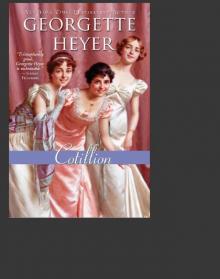 Cotillion
Cotillion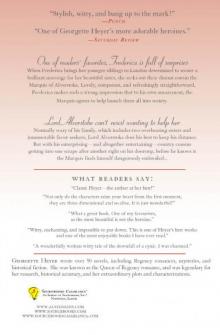 Frederica
Frederica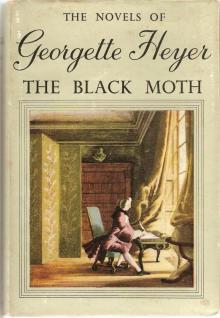 The Black Moth: A Romance of the XVIIIth Century
The Black Moth: A Romance of the XVIIIth Century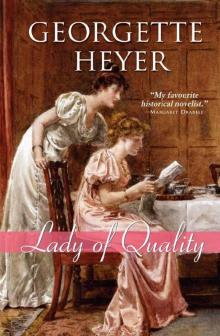 Lady of Quality
Lady of Quality Snowdrift and Other Stories
Snowdrift and Other Stories An Infamous Army
An Infamous Army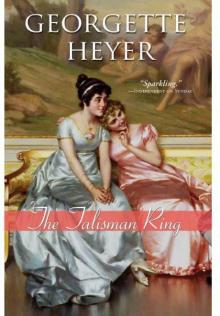 The Talisman Ring
The Talisman Ring Venetia
Venetia The Quiet Gentleman
The Quiet Gentleman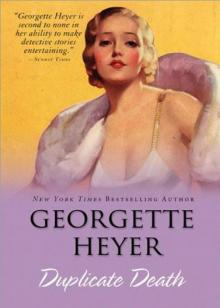 Duplicate Death
Duplicate Death Cousin Kate
Cousin Kate Black Sheep
Black Sheep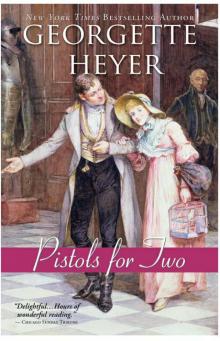 Pistols for Two
Pistols for Two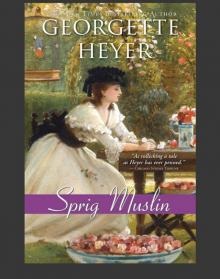 Sprig Muslin
Sprig Muslin No Wind of Blame
No Wind of Blame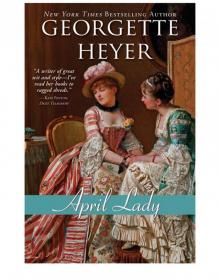 April Lady
April Lady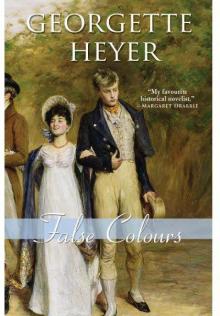 False Colours
False Colours Regency Buck
Regency Buck The Toll-Gate
The Toll-Gate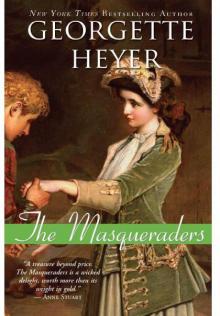 The Masqueraders
The Masqueraders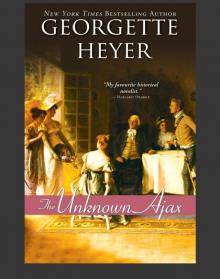 The Unknown Ajax
The Unknown Ajax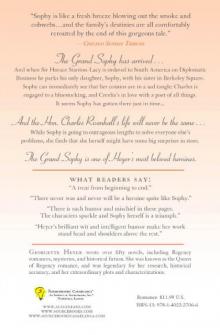 The Grand Sophy
The Grand Sophy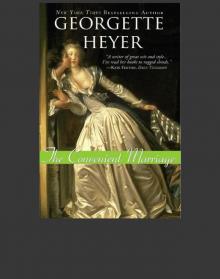 The Convenient Marriage
The Convenient Marriage Faro's Daughter
Faro's Daughter The Conqueror
The Conqueror The Foundling
The Foundling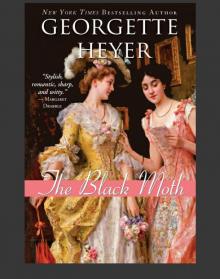 The Black Moth
The Black Moth The Transformation of Philip Jettan
The Transformation of Philip Jettan Friday's Child
Friday's Child Beauvallet
Beauvallet They Found Him Dead
They Found Him Dead Charity Girl
Charity Girl Death in the Stocks: Merely Murder
Death in the Stocks: Merely Murder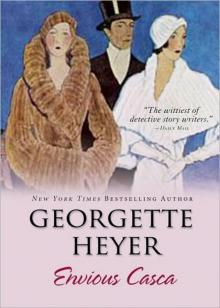 Envious Casca
Envious Casca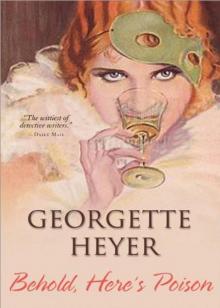 Behold, Here's Poison
Behold, Here's Poison Arabella
Arabella The Nonesuch
The Nonesuch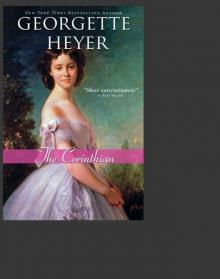 The Corinthian
The Corinthian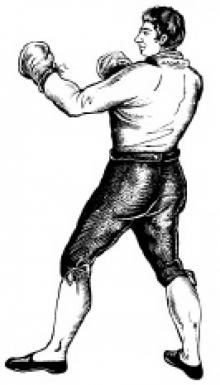 Jennifer Kloester
Jennifer Kloester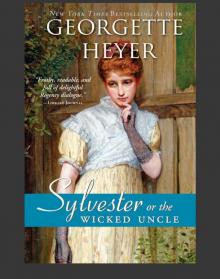 Sylvester
Sylvester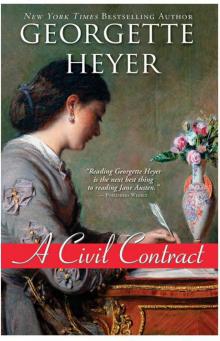 A Civil Contract
A Civil Contract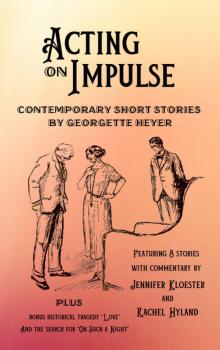 Acting on Impulse
Acting on Impulse Devil’s Cub at-2
Devil’s Cub at-2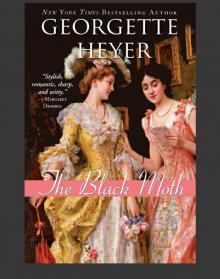 Black Moth
Black Moth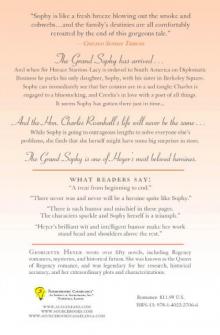 Grand Sophy
Grand Sophy Instead of the Thorn
Instead of the Thorn Masqueraders
Masqueraders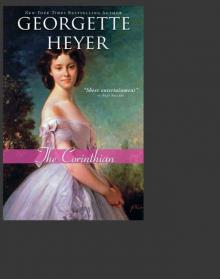 Corinthian
Corinthian Reluctant Widow
Reluctant Widow